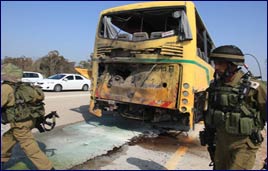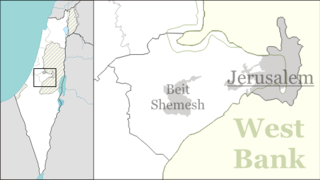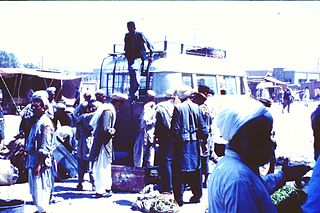
The politics of Nepal functions within the framework of a parliamentary republic with a multi-party system. Executive power is exercised by the Prime Minister and their cabinet, while legislative power is vested in the Parliament.

The Nepalese Civil War was a protracted armed conflict that took place in the former Kingdom of Nepal from 1996 to 2006. It saw countrywide fighting between the Nepalese royal government and the Communist Party of Nepal (Maoist), with the latter making significant use of guerrilla warfare. The conflict began on 13 February 1996, when the CPN (Maoist) initiated an insurgency with the stated purpose of overthrowing the Nepalese monarchy and establishing a people's republic; it ended with the signing of the Comprehensive Peace Accord on 21 November 2006.

The Communist Party of Nepal (Maoist Centre) (Nepali: नेपाल कम्युनिस्ट पार्टी (माओवादी केन्द्र)), abbreviated CPN (Maoist Centre), CPN-Maoist Centre, CPN Maoist Centre, or CPN (MC), is the third largest political party in Nepal and a member party of Socialist Front. It was founded in 1994 after breaking away from the Communist Party of Nepal (Unity Centre). The party launched an armed struggle in 1996 against the Nepalese government. In 2006, the party formally joined mainstream politics after signing a peace agreement following the 2006 Nepalese revolution.

Terrorism in India, according to the Home Ministry, poses a significant threat to the people of India. Compared to other countries, India faces a wide range of terror groups. Terrorism found in India includes Islamic terrorism, separatist terrorism, and left-wing terrorism India is one of the countries most impacted by terrorism.

The Communist Party of Bhutan (Marxist–Leninist–Maoist) (abbr. CPB (MLM)) is an underground communist party in Bhutan.
Left-wing terrorism or far-left terrorism is terrorism motivated by left-wing or far-left ideologies, committed with the aim of overthrowing current capitalist systems and replacing them with communist or socialist societies. Left-wing terrorism can also occur within already socialist states as criminal action against the current ruling government.
The Janatantrik Terai Mukti Morcha (JTMM) is a political organisation in Nepal. It was formed in 2004 as a split from the Communist Party of Nepal (Maoist) (CPN-M) around Jay Krishna Goit. The group accused the CPN-M of not guaranteeing the autonomy of the Terai region.

Constituent Assembly elections were held in Nepal on 10 April 2008, having been postponed from earlier dates of 7 June 2007 and 22 November 2007. The Constituent Assembly was planned to draft a new constitution and therefore decide, amongst other things, on the issue of federalism. The number of eligible voters was around 17.5 million. The Constituent Assembly was originally set to have a term of two years.

General Rookmangud Katawal is a former Nepalese Army general, who served as the Chief of Army Staff of the Nepal Army from 2006 to 2009. General Katawal has come across controversy after the then Prime Minister Pushpa Kamal Dahal unilaterally decided to sack Katawal on May 3, 2009.

The Communist Party of Nepal (Revolutionary Maoist) (Nepali: नेपाल कम्युनिष्ट पार्टी (क्रान्तिकारी माओवादी)), abbreviated CPN (RM), was a communist party in Nepal. It was founded on June 2012 by the then vice-chairman of Unified Communist Party of Nepal (Maoist), Mohan Baidya after splitting from the party.

The Shaar HaNegev school bus attack was a missile attack on 7 April 2011, in which Hamas militants in the Gaza Strip fired a Kornet laser-guided anti-tank missile over the border at an Israeli school bus, killing a schoolboy.

A twin suicide bombing of an Egged bus occurred in the French Hill settlement of northern East Jerusalem on 18 May 2003. Seven passengers were killed in the attack, and 20 injured. A few minutes after the first attack, a second suicide bomber blew himself up at the entrance to the village of Dahiya el-Barid, near Jerusalem. Only the bomber was killed in what appeared to be a premature detonation.
Constituent Assembly elections were held in Nepal on 19 November 2013. The vote was repeatedly delayed, having previously been planned for 22 November 2012 following the dissolution of the 1st Constituent Assembly on 27 May 2012, but it was put off by the election commission. The Nepali Congress emerged as the largest party in the 2nd Nepalese Constituent Assembly, winning 196 of the 575 elected seats.

The 2012 Tel Aviv bus bombing was a mass-injury terror attack carried out on November 21, 2012, on a crowded passenger bus driving in the center of Tel Aviv's business district. The attack was carried out by an Israeli citizen of Arab descent, who remotely detonated an explosive device, which he had hid on the bus in advance. Twenty-eight civilians were injured in the attack, among them three who were injured seriously. The attack was carried out on the 8th and last day of Operation Pillar of Defense, only a few hours before the ceasefire was reached.
On 27 July 2015, three gunmen dressed in army uniforms opened fire on a bus and then attacked the Dina Nagar police station in Gurdaspur district of Punjab, India. The attack resulted in the death of three civilians and four policemen, including a superintendent of police; fifteen others were injured. In addition, five bombs were found planted on the Amritsar–Pathankot line on a rail-bridge near Parmanand railway station, five kilometers from the site of the attack. All three attackers were killed in the operation, which lasted almost 12 hours.
The Aluth Oya massacre was the massacre of 127 Sinhalese civilians, including children and women, by the cadres of Liberation Tigers of Tamil Eelam organization on April 17, 1987, near the village of Aluth Oya, on the Habarana Trincomalee road in North Central Province of Sri Lanka. This massacre is considered one of the most notorious and devastating atrocities committed by the LTTE during the history of the Sri Lankan Civil War.
The Commission of Inquiry to Locate the Persons Disappeared during the Panchayat Period (1990–1991) is a truth commission established in Nepal in 1990 after the end of the autocratic Panchayat Regime by the first post-Panchayat Prime Minister Krishna Prasad Bhattharai. The commission was set up to examine allegations of human rights violations and inquire about enforced disappearances during the Panchayat system from 1961 to 1990. A report was officially submitted to the government in 1991, but it was made public only in 1994. The commission identified 35 persons disappeared on about one hundred studied cases. However, no alleged perpetrators were judged.

On June 20, 2016, at around 0600 AFT, a suicide bombing attack claimed to be conducted by the Taliban or the Islamic State in Khorasan Province (IS-KP) hit a convoy of Canadian embassy security guards en route to the embassy in Kabul. The attack took place in the ninth police district in the Benayi area, Kabul, Afghanistan. Thirteen Nepalese and two Indian contractors were killed in the attack.
From late October to mid November 2021, the Allied Democratic Forces (ADF) and the Islamic State organization carried out four bombing attacks across Uganda.











